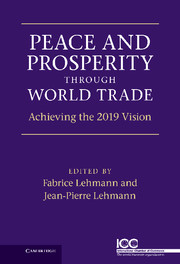Book contents
- Frontmatter
- Contents
- Notes on contributors
- Foreword
- Preface: the ICC vision
- Historical overview and dynamics
- Editorial note
- A Global systemic transformations
- B Governance of global trade
- C Poverty and global inequities
- D The long view on interlocking crises
- Editorial introduction
- D1 Trade and sustainable development: the ends must shape the means
- D2 Trade and climate change: the linkage
- D3 Destructive trade winds: trade, consumption and resource constraints
- D4 Trade and energy: a new clean energy deal
- D5 Agriculture and international trade
- D6 Water scarcity: how trade can make a difference
- D7 Water resources: a national security issue for the Middle East
- D8 Trade, technology transfer and institutional catch-up
- D9 A frail reed: the geopolitics of climate change
- E Global business responsibilities
- Conclusion: the imperative of inclusive global growth
- Index
D1 - Trade and sustainable development: the ends must shape the means
Published online by Cambridge University Press: 05 July 2011
- Frontmatter
- Contents
- Notes on contributors
- Foreword
- Preface: the ICC vision
- Historical overview and dynamics
- Editorial note
- A Global systemic transformations
- B Governance of global trade
- C Poverty and global inequities
- D The long view on interlocking crises
- Editorial introduction
- D1 Trade and sustainable development: the ends must shape the means
- D2 Trade and climate change: the linkage
- D3 Destructive trade winds: trade, consumption and resource constraints
- D4 Trade and energy: a new clean energy deal
- D5 Agriculture and international trade
- D6 Water scarcity: how trade can make a difference
- D7 Water resources: a national security issue for the Middle East
- D8 Trade, technology transfer and institutional catch-up
- D9 A frail reed: the geopolitics of climate change
- E Global business responsibilities
- Conclusion: the imperative of inclusive global growth
- Index
Summary
‘Free trade is like heaven,’ goes an old tease among trade negotiators. ‘We all want to get there – but not just yet.’ The reverse is the case when it comes to sustainable development; we wish we were there already. We all aspire to economic growth that is resilient, equitable and doesn't come at the expense of the health of our environment. But despite having a fairly good idea of how consumption, investment and production patterns need to change to make our growth trajectories more sustainable, societies have been lamentably slow to shift direction. Unsustainability can be aggravated or reversed through policies, domestic and international. In this context, it now seems clear, persistent unsustainability is partly the result of embedded inertia in lifestyles, allocation of resources and technological change; partly a consequence of inadequate institutions to deliver social primary goods, and of the inability of governments to agree to and establish international arrangements that ensure an enabling distribution of benefits of global relations. In the absence of a global state, a world operated collectively by and for actors of greater or lesser economic stride, requires performing global regulatory and incentive frameworks and institutions to manage economic and physical interdependence.
Our failure to achieve sustainable development is writ large across the world. While economic growth in China and India has propelled hundreds of millions of people out of poverty, 2009, for the first time in history, saw our planet host to over one billion hungry people while large swathes of the developing world remain mired in economic stagnation or outright decline, environmental degradation and crippling conflict.
- Type
- Chapter
- Information
- Peace and Prosperity through World TradeAchieving the 2019 Vision, pp. 185 - 190Publisher: Cambridge University PressPrint publication year: 2010

